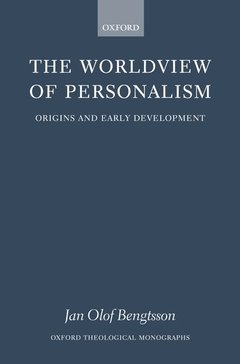Description
The Worldview of Personalism
Origins and Early Development
Oxford Theological Monographs Series
Author: Bengtsson Jan Olof
Language: English
Approximative price 222.89 €
Subject to availability at the publisher.
Add to cart
Publication date: 11-2006
320 p. · 16x24 cm · Paperback
320 p. · 16x24 cm · Paperback
Description
/li>Contents
/li>Biography
/li>Comment
/li>
Personalism is understood today as the name of an important current in twentieth-century thought which, inspired by the Christian and humanistic traditions of the West, has sought to deepen our understanding of the meaning and value of human personhood. Opposing both individualism and collectivism, personalism has stressed the uniqueness of each person, the meaning and value of interpersonal relations, and the unity that holds persons together and is, ultimately, also personal in itself: the person of God. Personalism's insights into the nature of personhood have broad implications for our view of ethics, politics, education, and religion. The history of personalism has, however, been poorly understood. Jan Olof Bengtsson shows that personalism began as early as the eighteenth century and was a central, international current of thought throughout the nineteenth century - that it was, in fact, more characteristic of the nineteenth century than of the twentieth.
Introduction. 1. The current view of personalism and its origins. 2. Personal `reason' and impersonal `understanding'. 3. The personal absolute. 4. Personal unity-in-diversity. 5. Early personalism and its meaning.
Jan Olof Bengtsson teaches the history of ideas at Lund University.
Jan Olof Bengtsson's The Worldview of Personalism is, if anything, a historical tour de force. While the book's aim goes beyond mere history readers cannot but be impressed by its account of the early personalists and their influence on later writers. The discussion of Jacobi, Schelling, and Lotze is particularly noteworthy and with this discussion the development of both European and Anglo-American personalism must hereafter be seen in a new light.
© 2024 LAVOISIER S.A.S.




